HOSTED BY: 1 AIR TRAVEL
In the summer of 1860, a ship called the Clotilda set sail from West Africa to Alabama’s Mobile Bay carrying 110 enslaved Africans. Though domestic slavery was still legal, the international slave trade had been outlawed 52 years prior. In an attempt to conceal his crime, the man who had arranged the transfer, Timothy Meaher, ordered the ship to be burned and sunk after the captives were offloaded and sold to nearby plantation owners.
Unable to return to their homes in Africa when slavery was abolished in 1865, the survivors found a new home in Alabama. They purchased land and built their own independent community in Mobile known as Africatown. That community still stands today.
In 2019, the shipwreck of the Clotilda — the last known U.S. slave ship — was found at the bottom of the Mobile River. Now, visitors from all over the world can view the remnants of the 163-year-old ship right in the heart of Africatown at Clotilda: The Exhibition.
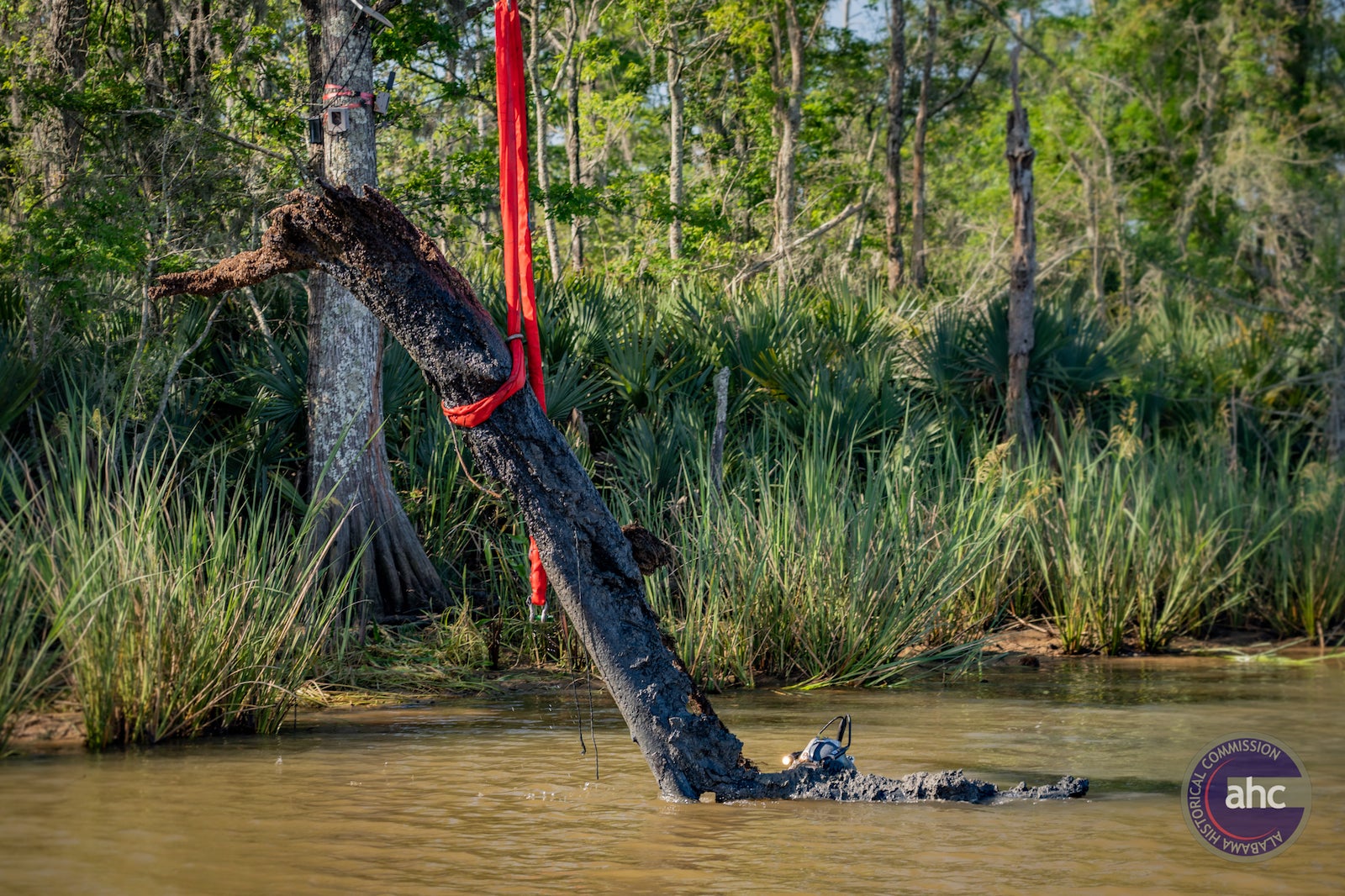
Remnants of the Clotilda being excavated from the Mobile River. ALABAMA HISTORICAL COMMISSION
Discovering the remnants of the Clotilda may have planted the seeds for the recently opened exhibition. However, the fruits bore from those seeds have far less to do with the ship itself than with the survivors who made that arduous journey and their direct descendants.
Clotilda: The Exhibition is a collaboration between the History Museum of Mobile, which curated, constructed and funded the exhibition; the Alabama Historical Commission, which led the scientific efforts surrounding the search; the Mobile County Commission, which built the Africatown Heritage House, where the exhibition is being held; and, of course, the descendants of the Clotilda’s survivors.
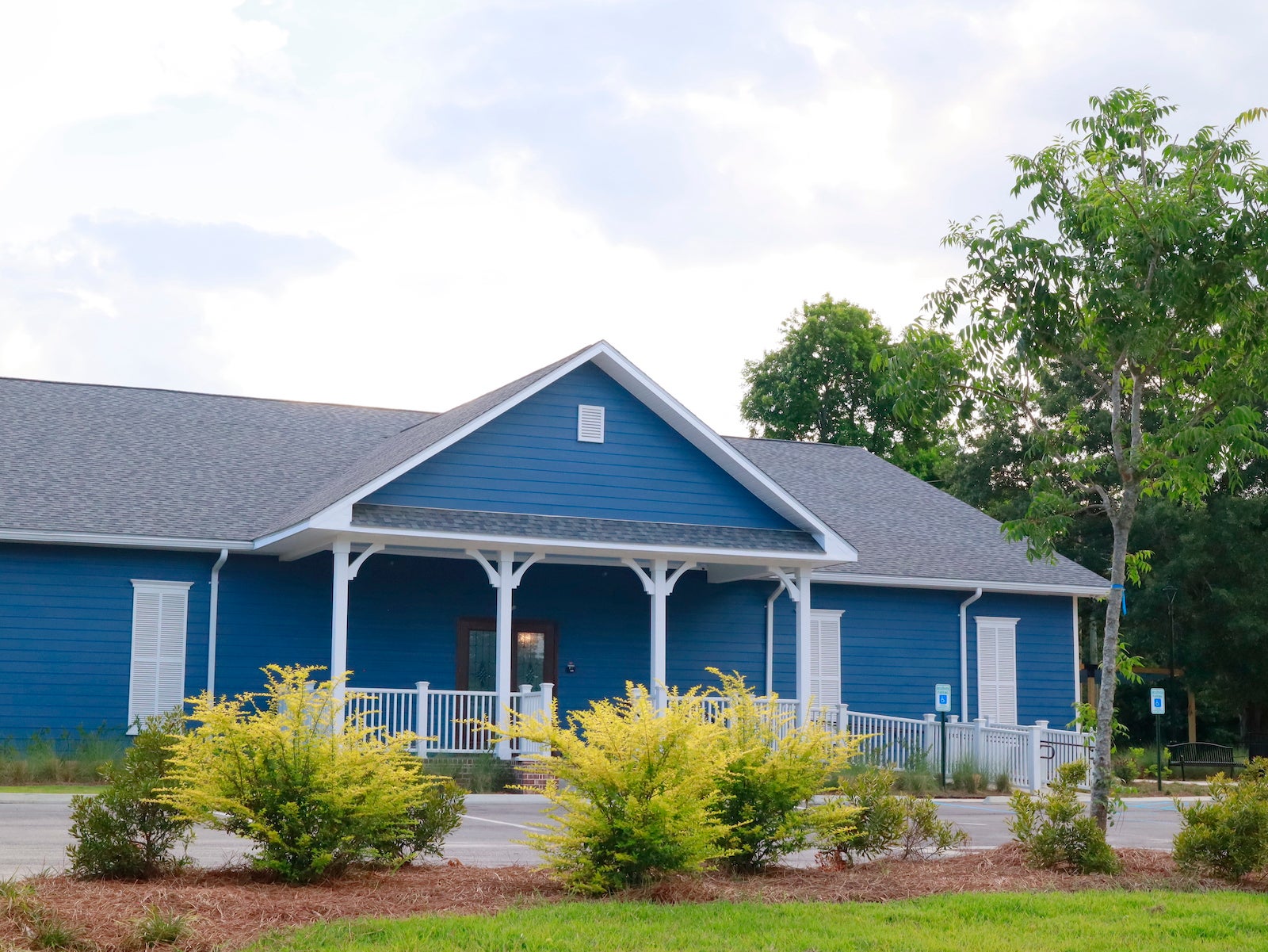
Africantown Heritage House. TIFFANY POGUE
“It’s not about the ship. It’s about the people,” Meg Fowler, the director of the History Museum of Mobile, told TPG. “The story starts by introducing you to the people who would eventually be on the Clotilda and their lives in West Africa.”
As you move from room to room, you learn about the voyage, the grim realities of the slave trade, the resilience of the survivors and the community of Africatown.
“Only at the end do you see the fragments of the shipwreck,” Fowler shared. “You learn the stories of the people and gain that context before you come to the moment of seeing pieces of the ship.”
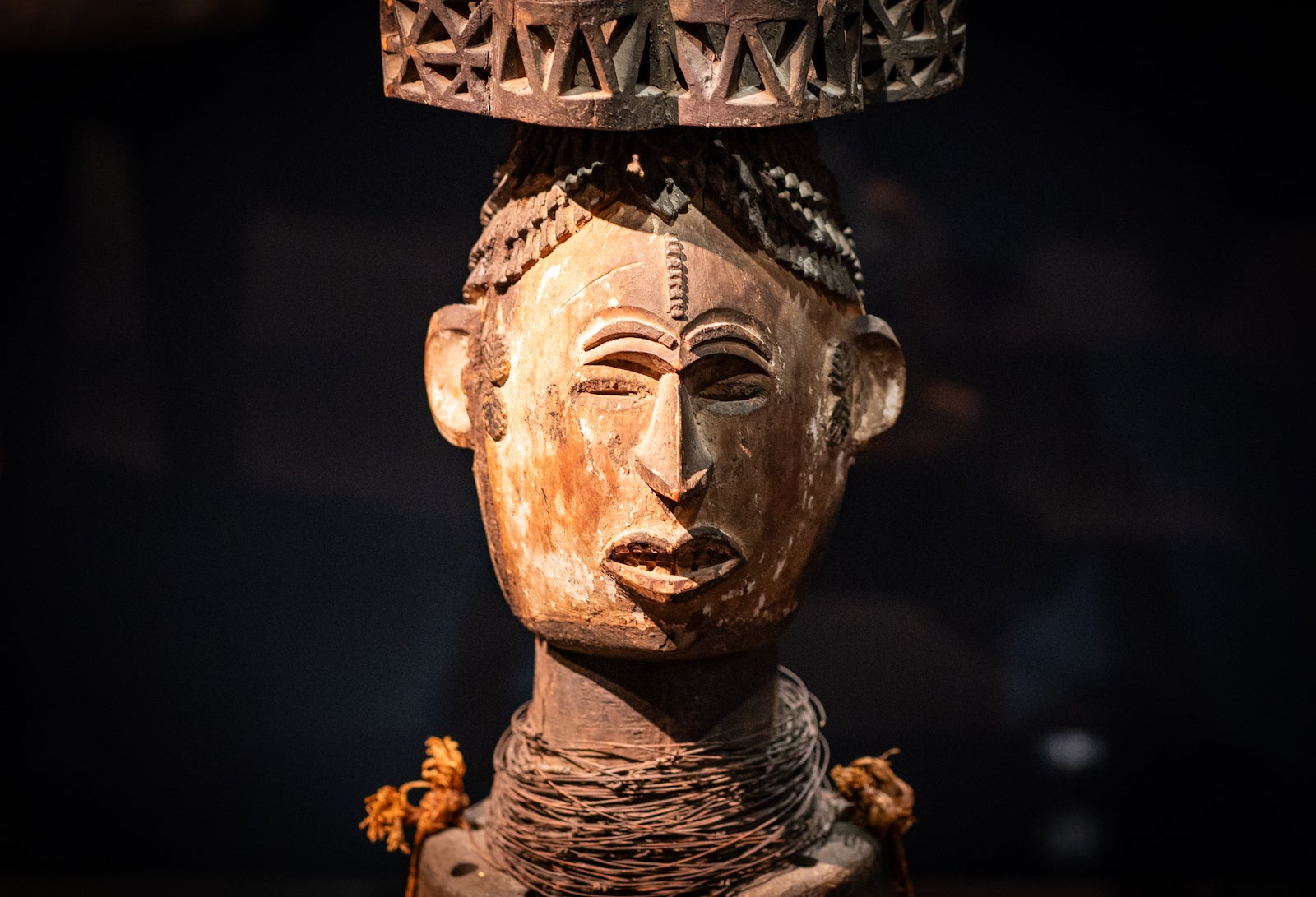
West African artifact on display at Clotilda: The Exhibition. HISTORY MUSEUM OF MOBILE
Part of what makes the story of the Clotilda unique is that there are so many recorded first-person accounts from the survivors. Some lived into the 1920s and beyond, and they passed down their first-person accounts of the voyage.
Using this documentation, curators could reproduce accurate and heart-wrenching accounts from Clotilda survivors who eventually came to reside in Africatown after slavery was abolished.
“We were able to center the voices of the 110 survivors where the historical record allows,” Fowler said.
The voices of the Clotilda descendants are also prominent throughout the exhibition. In one room, there is a wall of names that memorializes the 110 survivors by both their African and American names. Only 35 of those names are known so far, and you can hear the voices of the survivors’ descendants read each name aloud. For each of the other 75 listings, you will hear a descendant repeat the word “unknown.”
In this same room, you’ll find what Fowler refers to as “the heart of the exhibition.” This is where you can learn about the founding of Africatown.
“It celebrates the resistance and resilience of the 110 survivors and how remarkable the community of Africatown is,” Fowler said.
On display, you’ll find land deeds, marriage certificates and stories of the school, church and other institutions the residents established.
From there, you can view the actual remnants of the Clotilda, displayed in water tanks that help preserve them. Even here, though, the focus remains on the people, not the ship. In addition to plaques that explain how each remnant is verified to be from the Clotilda, there are quotes from descendants that describe what the Clotilda’s discovery means to them.
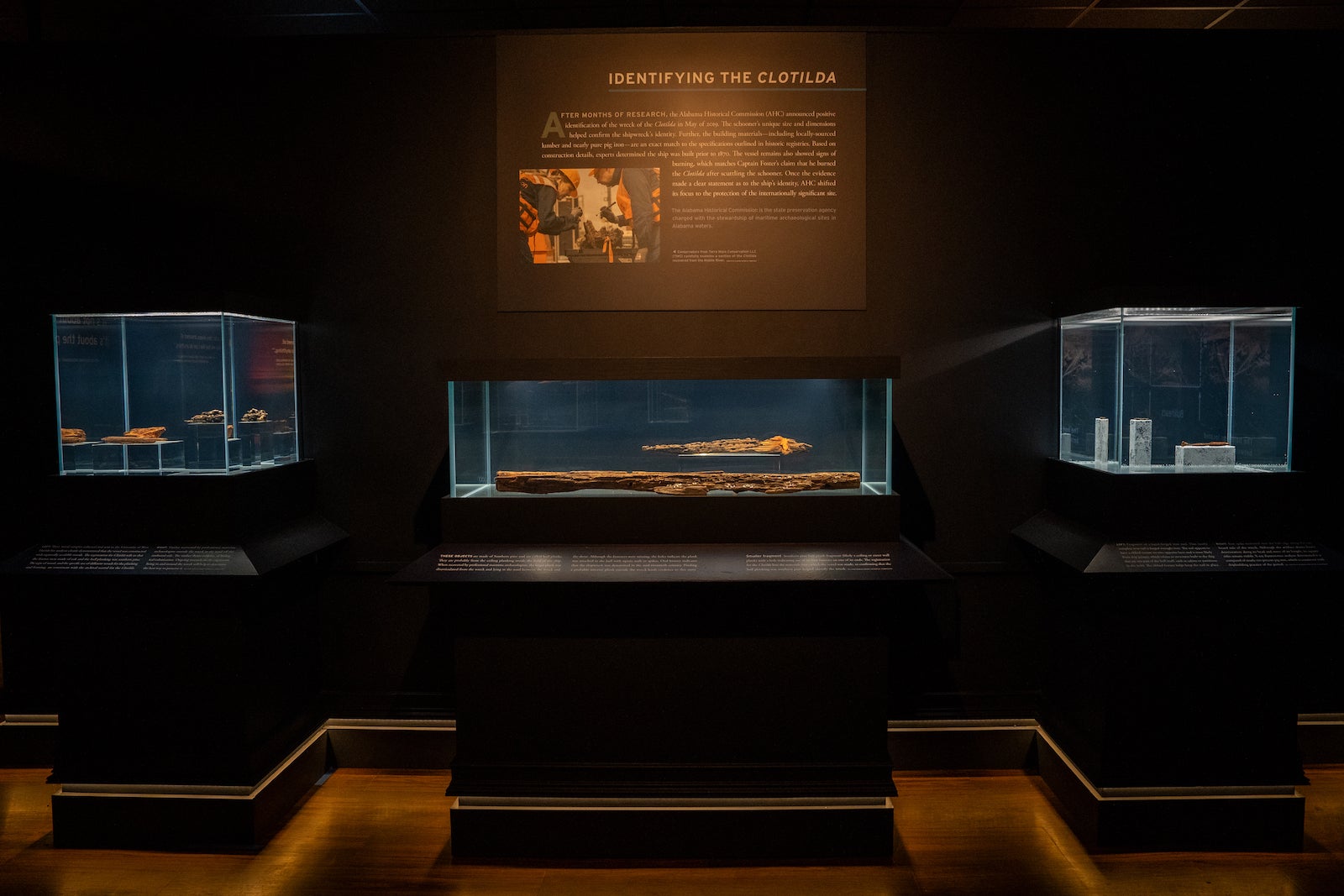
HISTORY MUSEUM OF MOBILE
In the exhibition’s final room, visitors learn from the descendants themselves about the Africatown of today and what the future holds for the community.
One of those descendants is Joycelyn Davis, a current resident of Africatown. Davis is the co-founder and vice president of the Clotilda Descendants Association, the organizer of the annual Spirit of Our Ancestors Festival and the community engagement officer for Africatown C.H.E.S.S. (Clean, Healthy, Safe, Educated, Sustainable) — an organization dedicated to the preservation and prosperity of Africatown.
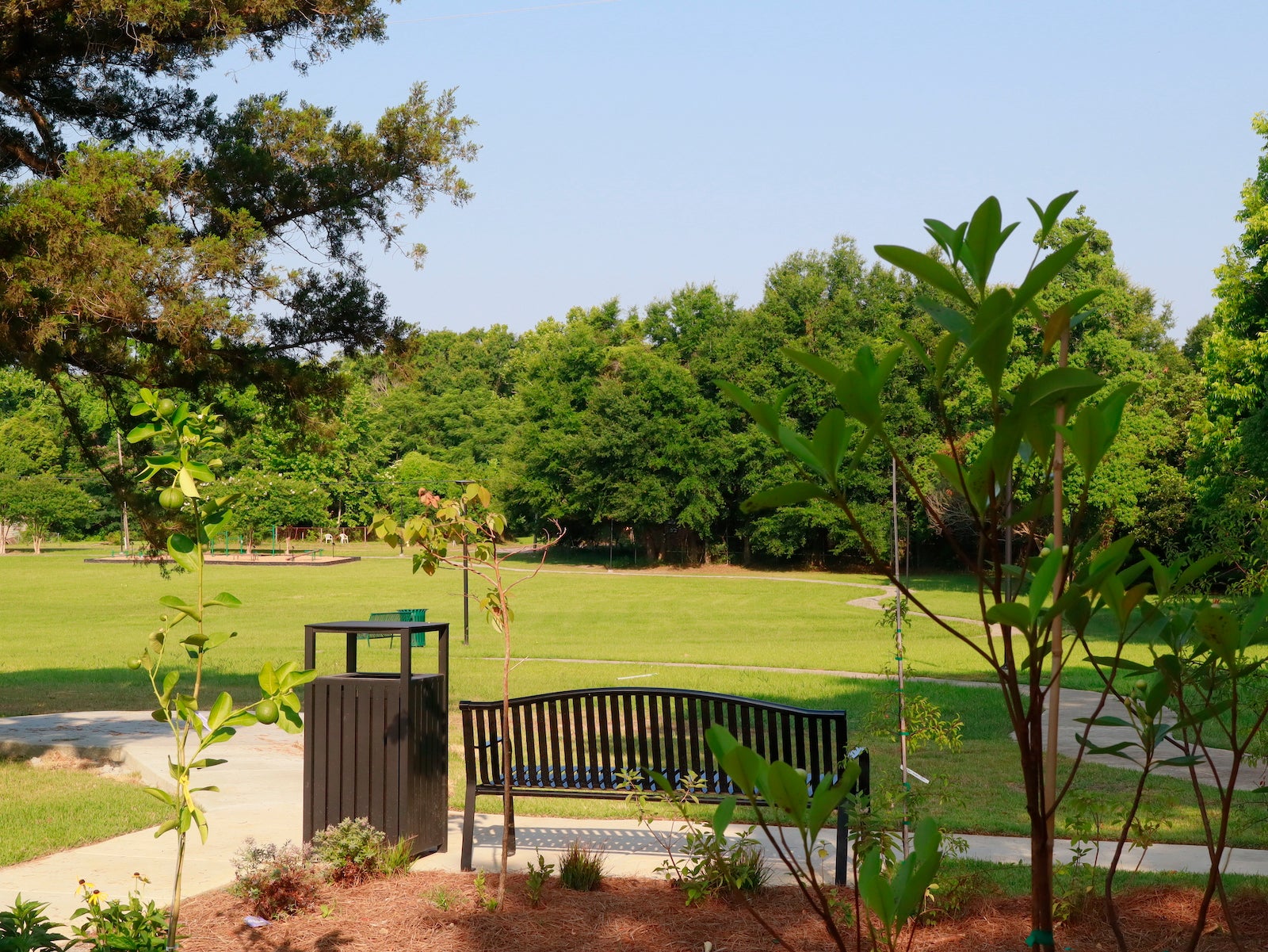
Park behind Africatown Heritage House. TIFFANY POGUE
Davis has lived in Africatown all her life and is a fierce advocate for the community. Even so, her initial reaction to the Clotilda’s discovery was one of mixed emotions. She didn’t want the public’s fascination with the ship to overshadow the stories of her ancestors.
“Theirs is a story of resilience, courage and pride, and that’s what I want people to take away,” Davis said. “I’m glad because it gives people a chance to know about all of the ancestors that were documented and what they were able to do together as a group.”
When Davis travels, she goes to see the tourist spots where she can really learn about the history of an area. She can already see in her mind that Africatown can be one of those destinations.
“It’s great having the Africatown Heritage House, and I’m hopeful we can do other things to rebuild the community,” Davis said.
In fact, she is already well on her way to doing just that. Along with other community members, Davis recently completed a tour guide training program to bring to life Africatown Freedom Tours. In addition to seeing the exhibition, visitors can deepen their knowledge and understanding of Africatown and its heritage through an educational sightseeing tour of the area.
Davis hopes this is only the beginning of what’s to come for Africatown.
“The story is rich, but it doesn’t match the neighborhood,” she said, pointing out that visitors will see dilapidated houses in Africatown’s current landscape.
But if she has anything to say about it, that is all about to change. She is currently working with other community members to draw in the next generation of Africatown residents.
“We want to bring in things that will be attractive to the next generation, whether that is a cafe, an entertainment district or even a container yard where young professionals can get together,” Davis said.
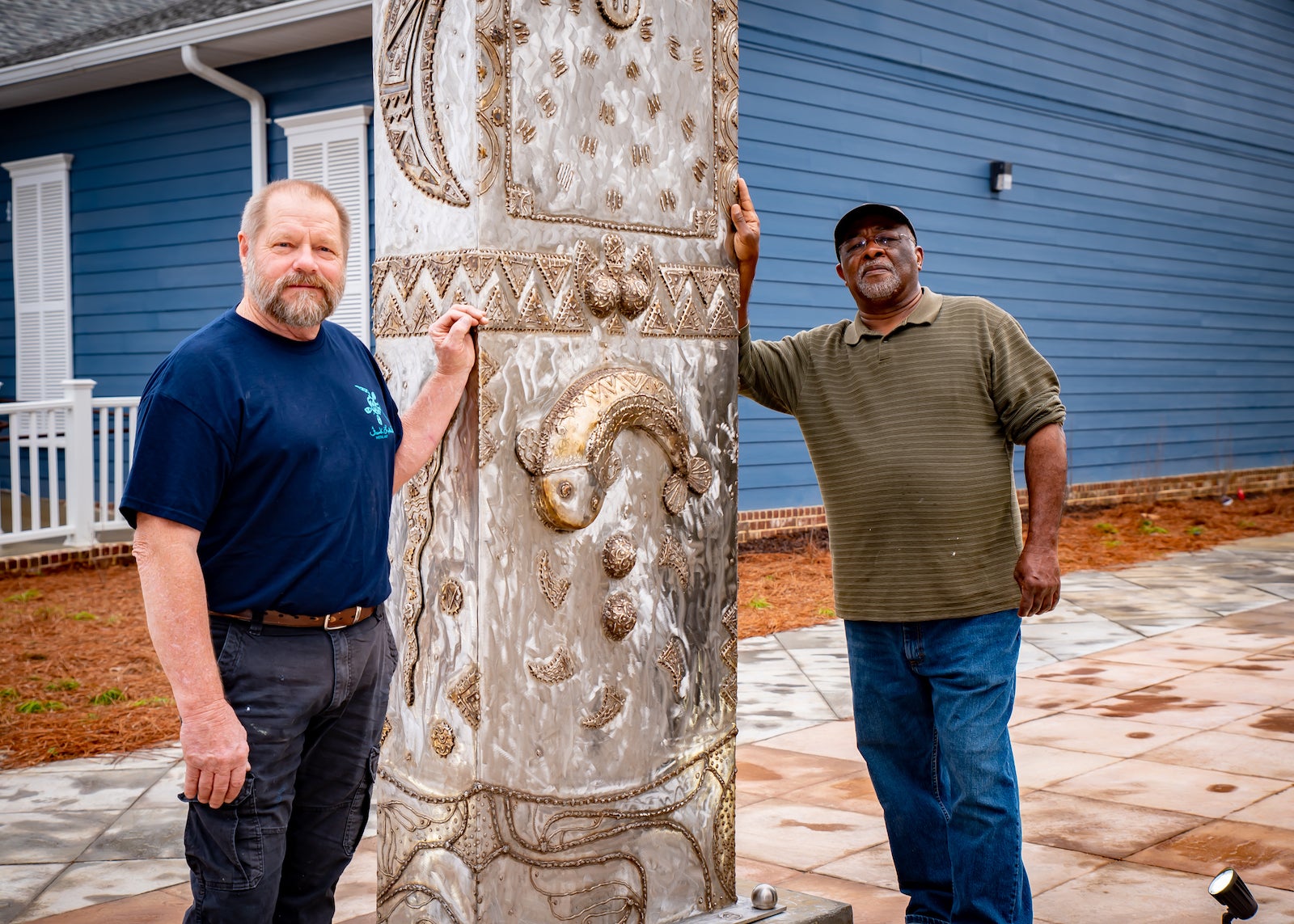
The Memory Keeper sculpture, created by Charles Smith and Frank Ledbetter, represents the past, present and future of Africatown. MOBILE COUNTY COMMISSION
Fowler similarly wants the Africatown Heritage House to be more than just a museum.
“This is the beginning of how we tell the story, not the final chapter,” she said. “We want to be the first stop. Once people learn about Africatown, we can connect them with other resources to help with ongoing education and support of the community.”
Whether or not you can visit in person, there are ways you can support Africatown Heritage House and Clotilda: The Exhibition. The following Africatown organizations are currently accepting donations:
Africatown C.H.E.S.S.Africatown Heritage Preservation FoundationThe Clotilda Descendants AssociationM.O.V.E Gulf Coast Community Development CorporationMobile County Training School Alumni AssociationMobile Environmental Justice Action CoalitionOf course, the best way to show your support is by visiting in person. Clotilda: The Exhibition at Africatown Heritage House is open Tuesday through Saturday from 10 a.m. to 5 p.m. The exhibition will have limited capacity, so you should purchase tickets in advance.
Title: New exhibition honors the survivors and descendants of last known US slave ship, the Clotilda
Sourced From: thepointsguy.com/news/clotilda-the-exhibition-africatown-heritage-house/
Published Date: Fri, 14 Jul 2023 12:00:13 +0000
No comments:
Post a Comment